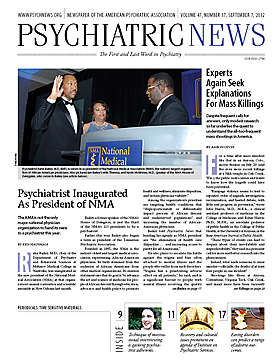Researchers at Harvard Medical School have published work showing that binge-eating disorder (BED) and purging disorder are common among young girls and that their presence can predict a range of adverse outcomes, including binge drinking and drug use.
Alison Field, Sc.D., an associate professor in the Department of Epidemiology at Children’s Hospital in Boston and an associate professor of pediatrics at Harvard, and her colleagues sought to elaborate on the association of common eating disorders such as BED with adverse outcomes. They believe their work, published online July 16 in Pediatrics, is the first to evaluate the prospective association of full and sub-threshold bulimia nervosa (BN), BED, purging disorder (PD), and other eating disorders not otherwise specified (EDNOS) with mental the physical health outcomes.
“Anorexia nervosa (AN) and BN are rare, but EDNOS are relatively common among females,” they explained. “Our objective was to evaluate whether BN and subtypes of EDNOS are predictive of developing adverse outcomes.”
To do so, the researchers performed a prospective analysis of 8,594 females from the ongoing Growing Up Today Study. The study method consisted of sending questionnaires annually from 1996 through 2001 to the participants, who were aged 9 to 15 in 1996. Those who completed at least two consecutive questionnaires during the period were included in the analyses.
Participants were classified as having BN (binge eating and purging occurring one or more times per week), BED (binge eating one or more times per week, with infrequent purging), PD (purging one or more times per week with infrequent binge eating), other EDNOS (binge eating and/or purging monthly), or as nondisordered.
Participants were also asked about binge drinking, with those who reported at least six episodes of binge drinking in the prior year classified as frequent binge drinkers. Then they were asked about their use of marijuana, hashish, cocaine, crack, heroin, ecstasy, PCP, gamma-hydroxybutyrate, LSD, mushrooms, ketamine, crystal methamphetamine, Rohypnol, or amphetamines, and about use of prescription drugs without a prescription.
Depressive symptoms were assessed by the six-item validated scale of the McKnight Risk Factor Survey IV.
BN, the researchers found, affected only about 1 percent of adolescent girls, while 2 percent to 3 percent had PD, and another 2 percent to 3 percent had BED, but girls with BED were almost twice as likely as their nondisordered peers to become overweight or obese or to develop high levels of depressive symptoms.
Participants with PD had a significantly increased risk of starting to use drugs and starting to binge drink frequently.
“Our results suggest that primary prevention should focus on prevention of disorders of at least subthreshold severity,” wrote Field and colleagues. “Future research should assess whether adolescents who binge and/or purge monthly need or benefit from treatment. Because treatment may differ according to severity of the disorder, a staging approach for eating disorders … is warranted.”
The study was funded by the National Institutes of Health.


